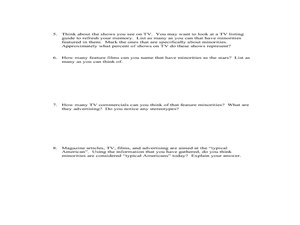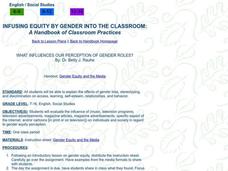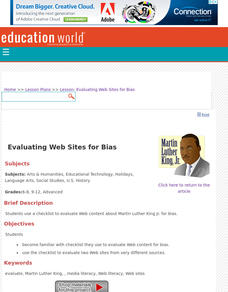101 Questions
Representative Sample
At what point does data switch from being an outlier to part of the average? Scholars view conflicting news articles about protesters. They must decide which, if any, side is using the correct sample to draw their conclusions. It's a...
Stanford University
Vicksburg
Long before the term fake news, media outlets offered competing narratives of events at the time. Looking at newspaper reports from the Battle of Vicksburg, class members consider two different versions of the strategic siege—one from...
K20 LEARN
The Bank Of Justice: Civil Rights In The US
To launch a study of racial segregation and integration, young historians first watch a news video about a prom in Georgia that was first integrated in 2013. They then compare the goals in Lincoln's Gettysburg Address to King's "I Have a...
Curated OER
Understanding Propaganda
Students define propaganda and give examples from the mass media. In this propaganda lesson, students review examples of propaganda and then research versions of it in the mass media.
Newseum
Civil Rights News Coverage: Looking Back at Bias
Not all southern newspapers covered the civil rights movement of the 1950s and 1960s. Young journalists investigate how The Lexington (Ky. Herald-Leader and The Jackson (Tenn.) Sun re-examined their coverage of the movement. After...
Curated OER
Exploring Media: Understanding and Identifying Editorial Perspective in Television and Radio News
Students research the topics Boat People: A Refugee Crisis, Dr. Henry Morgentaler: Fighting Canada's Abortion Laws, and CANDU: The Canadian Nuclear Reactor on the CBC Radio and Television Archives Web site.
Curated OER
Minorities in Mainstream American Society
So many people fought for Civil Rights in the United States. Read about the Civil Rights Act of 1964, and discuss what the act guarantees. Then pass out a slew of magazines and encourage them to observe how often minorities appear in...
Facing History and Ourselves
Hands Up, Don't Shoot!
Why is it so difficult to develop a clear understanding of the events surrounding the shooting of Michael Brown by a Ferguson, Missouri, police officer? To answer this question class members listen to a NPR discussion of the findings of...
Southern Poverty Law Center
Choosing Reliable Sources
It is more important than ever that 21st-century learners develop the skills they need to become savvy consumers of media. Young learners locate and identify reliable sources of information with a helpful media lesson.
Willow Tree
Data Sampling
Some say that you can make statistics say whatever you want. It is important for learners to recognize these biases. Pupils learn about sample bias and the different types of samples.
Academy of American Poets
Teach This Poem: “Making History” by Marilyn Nelson
What makes an event newsworthy, worth a reference in a news magazine or textbook? Who decides? These are questions Marilyn Nelson asks readers of her poem "Making History" to consider. To begin, class members list details they notice in...
Curated OER
Citizens and the Media / Lesson : 3 Compare and Contrast Daily Newspapers for fact, opinion and bias
Young scholars compare and contrast a variety of daily newspapers in order to detect bias. They critically analyze the role the media plays in responsibly reporting government activities.
News Literacy Project
Fact-Check It!
Here's a lesson designed to help learners develop their digital verification skills. First, expert groups study specific digital verification skills, and in a jigsaw activity, share what they have learned with classmates. The jigsaw...
Anti-Defamation League
Is Olympic Coverage Sexist?
Women Olympians have come a long way since 1900 when 22 women competed for the first time. News coverage of the Olympics has also changed dramatically. What has been slow to change, however, is the language used in the coverage of female...
Media Education Lab
Propaganda Techniques
In an age of fake news, alternative facts, and biased reporting, it is more important than ever that 21st century learners develop the critical-thinking skills necessary to recognize, analyze and resist the propaganda techniques used in...
iCivics
Mini-Lesson: Filibusters
How long can you speak without stopping? Scholars analyze the concept of a filibuster in the United States Senate using an installment of the Legislative Branch series of mini-lessons. They research recent filibuster attempts in the...
Idaho Coalition
The Hunger Games: Gender Empowerment
The odds are in your favor that your pupils will love this instructional activity that uses The Hunger Games to launch a study of gender empowerment, as well as the influence of social constructs of gender. Groups discuss how Katniss...
Anti-Defamation League
The Hate U Give
The Hate U Give by Angie Thomas became a quick hit in the young adult literature genre before its adaptation in the 2018 film of the same name. Use a thorough lesson, discussion guide, and series of activities to discuss the social...
Anti-Defamation League
The Gender Wage Gap
"Equal pay for equal work!" may sound logical but it is not the reality. High schoolers begin a study of the gender wage gap with an activity that asks them to position themselves along a line that indicates whether they strongly agree...
Curated OER
Parliamentary Newsroom : Developing Media Literacy
Students explain and examine the selection, development, sources, transmission and impact of news on the public. They write a brief essay on the topic: "The Public Must Be Critical In Their Assessment of the News Before Drawing...
Curated OER
WHAT INFLUENCES OUR PERCEPTION OF GENDER ROLES?
Young scholars talk about the influence of media on gender equity perception.
Curated OER
Evaluating Web Sites for Bias
Students become familiar with checklist they use to evaluate Web content for bias. They use the checklist to evaluate two Web sites from very different sources.
Curated OER
On the Air
Learners explore the issue of race in television since the 1950's, focusing specifically on African-American entertainers. After researching important issues, events, and television personalities of specific decades, students create TV...
Curated OER
World Media: Comparison of Iraq War Accounts
Students are introduced to the concept of news/media bias from region to region. Upon reading differing articles, students answer source questions on the structure/content of each article.

























